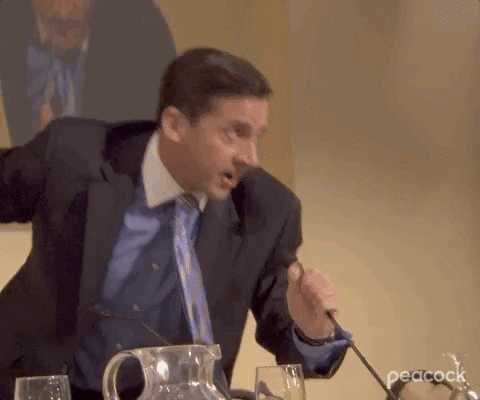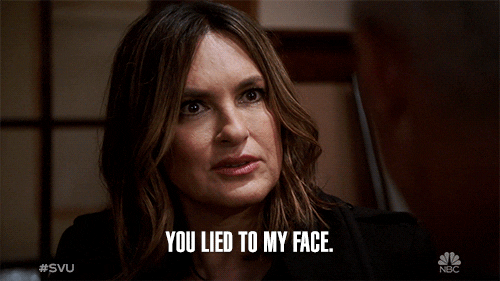Mic Drop #23: "The Office" on Peacock Is No Longer in Nielsen Ratings (2.0)
With more reporting on Peacock's future emerging, whither Peacock?
A quick note: re-sending after a few of you caught some minor errors. So if you’re receiving this twice, please disregard the first mailing.
It’s now April, and Nielsen’s Top 10s for streaming now reflect the first week of March.
One notable absence is The Office, which was a hit on Netflix. It was #1 for one week in December in the Nielsen SVOD ratings, then #5 in the last week of December 2020 with 937MM minutes watched. Its 192 posted episodes earned more than 1,279 billion minutes of total viewing in 2020.
On January 1 it moved to Peacock. Now, it’s nowhere to be found in the Nielsen ratings.
That was one of my predictions in my Lessons from 2020, Predictions for 2021 presentation. Under the heading “EXECUTIVES WHO NEED MORE OPERATIONAL AGILITY IN 2021”, I wrote:
The Office disappears from Nielsen Top 10 for SVOD by February 2021.
With The Office now having disappeared from the Nielsen Top 10 for all weeks since January 1, it’s mic drop time…
Whither The Office, and Whither Peacock?
Now, to concede, this prediction was a layup.1 That said, I thought about The Office this past week both after writing “A Short Essay on NBCU’s Possible New Streaming Service”, and after reading a Bloomberg article from Lucas Shaw, “Comcast Weighs Pulling Universal’s Movies From HBO Max, Netflix” on how:
…NBCUniversal is considering pulling its movies from HBO Max and Netflix Inc. and keeping future new film releases for its streaming service Peacock, according to people familiar with the matter.
I think the key paragraph in the piece is this one:
The outcome of the deliberations will say a lot about Comcast’s commitment to Peacock, a year-old streaming service that has 33 million accounts. The company has yet to commit as much money to original programming as some rivals.
This is the second time in the past week that reporting implied that both Comcast and NBCU are re-evaluating the road ahead for Peacock. The first was Business Insider’s Claire Atkinson reporting that “NBCUniversal has discussed a new subscription video-streaming service separate from Peacock” ($ - paywalled), which I dove into in “A Short Essay on NBCU’s Possible New Streaming Service”.
So, as I concluded in that essay, “it is clear Peacock has had a disappointing first year and has reached a crossroads.”
The framework for that essay was Fiduciary vs. Visionary Executives.
But given that Comcast is still giving us a vague “33MM registered users” as their user metric, and NBCU is spending $100MM/year for The Office to Universal Television and profit participants (including The Office creator Greg Daniels) over the next five years, it is worth briefly evaluating these two headlines through the framework of The Curse of the Mogul.
The Curse of the Mogul, NBCU, & The Office
First, there is something worth clarifying given conversations I had around my Lessons from 2020, Predictions for 2021 presentation: The Curse of the Mogul framework is not a negative lens on a company or its management. Its intent is not a message to media companies of:
Rather, it is a helpful test to evaluate whether a media company is destroying value in the pursuit of prestige, star showrunners and/or actors, and other intangible, optics-driven objectives. DTC business models have clear metrics like growth and churn, so they invite more disclosure than past legacy media models. The Curse of the Mogul framework helps to identify the “right” types of disclosure.
The “wrong” types of disclosure, like reporting “registered users” (which is effectively an email address) instead of paying subscribers, are signals that invite reasonable questions like, “what is holding back Comcast/NBCU from reporting Peacock paying subscribers?”
When we add in NBCU’s $500MM, five-year investment in The Office, and the disappearance of The Office from Nielsen’s Top 10, that question veers deeper into Curse of the Mogul territory, as all available objective evidence tells us that Universal Television (which auctioned The Office) and profit participants (including creator Greg Daniels) have reaped more value from the $500MM deal than Peacock.
And we find ourselves going even deeper into Curse of the Mogul territory with a reminder of how heavily Peacock was marketing The Office in January, when it offered pricing plans that seemed to be centered solely around The Office. In that plan, the highest tier ($9.99 a month), offered “all of The Office, and everything in Premium, without ads.”
In February, Jessica Toonkel of The Information revealed that internal NBCU data suggests this campaign was disappointing. By implication, early numbers on the $500MM investment in The Office suggest it is not on track to grow :
…data from an internal NBCU presentation viewed by The Information showed that Peacock recently had only 11.3 million “monthly active ad-supported accounts.” (Active accounts are households and can include multiple viewers). A Peacock spokesperson said the 11.3 million figure was low.
The data also suggests that Peacock’s priciest $9.99 tier that doesn’t carry ads only drew 4% of people signing up to use Peacock. Most viewers watch either the free tier or the $5 a month tier with some ads.
As I wrote on Monday:
At 4% of “people signing up” to use Peacock, that is either 452K paid subscribers (of 11.3MM households), or 1.32MM paid subscribers (of 33MM registered users), which is 3% of the near 40MM U.S. subscribers Disney signed up between November 2019 and February 2021.
At $100MM per year, and assuming 30% margins, Peacock needs at least 3.33x of either estimate, or 4.4.MM to 7.3MM new Premium ad-free subscribers watching The Office to breakeven on the investment in The Office, alone.
Peacock seems quite far away from that objective. And now, as per Bloomberg (above), deliberations about Peacock and future film releases will say a lot about Comcast’s commitment to Peacock. As per Business Insider’s Claire Atkinson, similar deliberations about Peacock and a need for more premium original programs are taking place, too.
The Curse of the Mogul framework is indeed raising the right, reasonable questions about the future of Peacock within Comcast and NBCU.
What Will Happen Next?
As I wrote on Monday, all reporting indicates that Peacock is at a crossroads.
I think we can put two-and-two together from the work of all three reporters (Atkinson, Shaw, Toonkel):
Peacock’s current original content library is not strong enough to convert and/or retain premium subscribers (Atkinson, Shaw)
Peacock’s ad-free subscription tier may be better off as a separate service internationally (“Universal Stream” SVOD), and potentially domestically, too (Atkinson, Toonkel)
Given 1 & 2, Peacock’s business and operational model is being re-evaluated as we speak.
The most fascinating variable in all of this is NBCU CEO Jeff Shell. Because all three articles reflect a CEO asking tough questions about the strategy he inherited from his predecessor. Through the lens of the Fiduciary vs. Visionary framework:
…Jeff Shell is not NBCU’s digital visionary executive - that role falls to Comcast’s Direct-to-Consumer Chairman, Matt Strauss. This leaves Shell as a well-compensated, C-Suite fiduciary executive with his choices constrained by the shortcomings of his predecessor’s objectives, and by what Comcast wants to do with NBCU.
And, through the lens of The Curse of the Mogul framework, Shell appears to be a CEO who inherited a Curse of the Mogul strategy from his predecessor, Steve Burke, a longtime legacy media executive who was CEO for NBCU from 2011 through 2020.
To Shell’s credit, he appears to be questioning everything about this strategy. As I wrote last January, Peacock’s go-to-market strategy invited more questions on top of the valid ones, above, which reporters have been surfacing:
Compared to Netflix's single consumer, DTC model, Peacock has laid the foundation of a messy web of target customers for NBCU to keep happy with Peacock's value proposition. They have created for themselves the problem of "serving too many masters".
If I may pause for a second to point out, all three stories above reflect that Peacock is indeed struggling to deliver a value proposition that maps to its target customers. So, another mic drop…
But second, to the credit of Shell and his team, the rumors of a Universal Stream service suggest that they are serious about building a DTC business that does not suffer from Curse of the Mogul-type symptoms.2
In short, the new strategy is focusing on no longer relying on “registered users” metrics: registered users as a metric is neither optically nor financially sustainable, especially with initial numbers suggesting The Office has not driven user acquisition.
Jeff Shell and his team need more operational agility for NBCU’s streaming strategy to succeed.
What comes next? My gut is that a Universal Stream international SVOD service makes more sense than Peacock’s three tiers. I think it makes more sense in the NBCU ecosystem than Peacock: the PARQOR Hypothesis framework tells us it is a smart bet with consumers to connect the Universal brand between Parks and Resorts and streaming.
It is a different question as to whether Comcast is willing to spend the billions required to pivot its streaming business around this new service, which involves hundreds of millions in lost licensing revenues and pivoting Peacock’s value proposition, too.
Why commit billions in additional capital to streaming when there are better returns in scaling its Flex software?
But with the caveat, as the Entertainment Strategy Guy pointed out to me, that Nielsen does not track Peacock. That said, they don’t track HBO Max, either, but issued ratings for Wonder Woman 1984 (and likely will for Zack Snyder’s Justice League). So my assumption is that if Nielsen and Peacock had a good story to tell about The Office on Peacock vs. Netflix, they would be telling it.
I also wonder given how heavily Peacock was relying on The Olympics to scale, whether both CBS’s disappointing Super Bowl LV ratings - especially ~5MM streaming viewers - and the lack of original library both point to Peacock’s model needing a rethink. Because the implication of the stories above is, even if Peacock had signed up subscribers to watch The Olympics, current data from major sports events (e.g., English Premier League) suggests there was not enough original library to keep audiences engaged.







